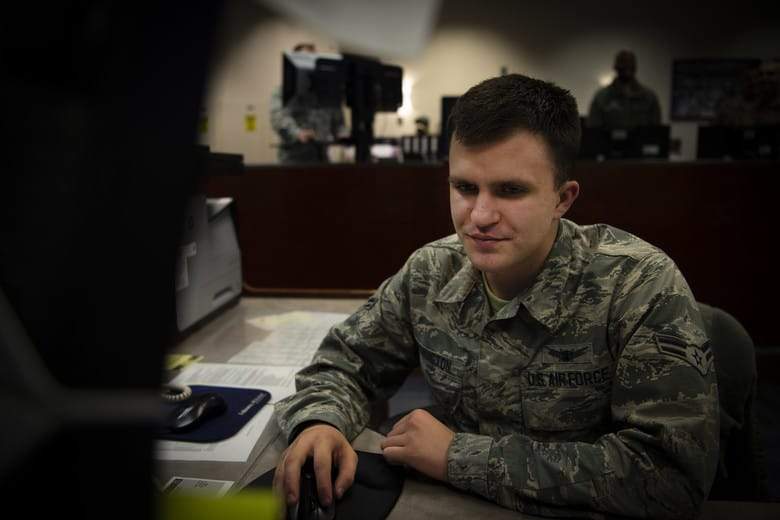Schriever stays operational despite COVID-19

The 50th Space Wing remains committed to maintaining space superiority year-round by continuing its essential missions to ensure it remains the ‘Master of Space.’
Despite the COVID-19 pandemic, Airman 1st Class Brice Brewington, 4th Space Operations Squadron extremely high frequency satellite systems operator is still contributing to the United States Space Force’s mission.
“It’s critical we continue the mission during trying times,” Brewington said. “Although there is a pandemic here on Earth, there’s no pandemic in space and our adversaries aren’t going to stop trying to gain superiority from us any time soon.”
As of March 20, there are no confirmed cases of COVID-19 on Schriever AFB. The 50th SW commander has enacted multiple safety measures, such as social distancing, minimum manning and temperature checks at the restricted area portals to protect Airmen and the base’s critical operations.
“We need to stay mission-ready rain, sleet, snow, hail and even during a pandemic to complete our mission at the most elite level possible,” Brewington said.
To minimize transmission, 4th SOPS Airmen use cleaning wipes and sanitation spray to clean their workstations. Additionally, accountability is taken daily to make certain the squadron’s Airmen are feeling healthy and well.
“I know the service I help provide is critical for [service members] downrange,” Brewington said. “I take my job very seriously, lives depend on it and we can’t let a pandemic slow down our operations.”
The 2nd Space Operations Squadron is one of the United States Space Force’s premier units. They operate the GPS mission, providing a global utility to Earth’s population for free.
“No matter what, we need to ensure this mission continues so the American people and the world know they can depend on us to be the gold standard in precision, navigation and timing,” said Lt. Col Stephen Toth, 2nd SOPS commander.
Some of the services that use GPS to operate are ambulances, hospitals, police departments and fire departments.
“It would make a global pandemic that much worse if we were to go down,” Toth said. “It could prevent a lot of the day-to-day things we rely on from happening, it could be catastrophic.”
According to a recent study conducted by U.S. Department of Transportation on the economic impact of GPS, a 30 day outage could range from a 2.7 to 5.5 billion dollar economic loss. Additionally, GPS supports 14 of 16 essential industries in the U.S.
“We’ll remain reliable no matter what the condition the world is in,” Toth said. “Whether it be a pandemic, hurricane, tornado or any other type of crisis, we have plans and training for whatever threat we may face so the mission doesn’t stop.”
Unlike other jobs across the Department of Defense, those directly conducting operations can’t telework. They need to be in a sensitive compartmented information facility or restricted area in a secured area to perform the mission. This so Airmen can access specific terminals and networks only accessible on the operations floor.
“The American people can count on space and they can count on our military to continue to provide the level of capability that's expected no matter what's going on in the world,” Toth said. “In times of crisis, people shouldn’t have to question whether we’ll be here or not, because we will and the mission won’t stop.”
Photo: Airman 1st Class Brice Brewington, 4th Space Operations Squadron extremely high frequency satellite systems operator, connects to a satellite Nov. 20, 2019, at Schriever Air Force Base, Colorado. Despite the ongoing pandemic, the 50th Space Wing remains committed to executing its critical operations. (U.S. Air Force photo by Airman 1st Class Jonathan Whitely)
Link: https://www.spaceforce.mil/News/Article/2120325/schriever-stays-operational-despite-covid-19











